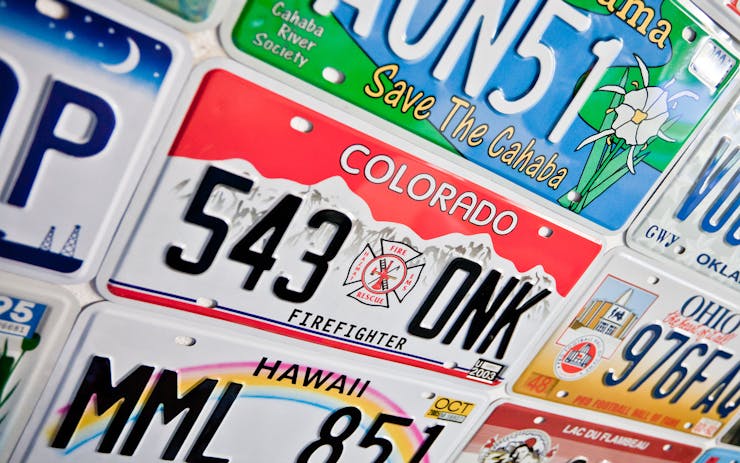Live in a legal cannabis state? Planning a road trip? Here’s some good news: A federal appeals court just ruled that police can’t search your car merely because you have out-of-state plates.
The new precedent comes courtesy of Peter Vasquez, who was pulled over late one night in December 2011 as he drove his recently purchased 1992 BMW sedan eastbound on I-70 through Kansas. Police said they couldn’t read the temporary license tag through the car’s tinted rear window.
Vasquez, at the time a resident of Colorado, was the car’s sole occupant. In the passenger seat next to him were blankets and a pillow, and one officer suspected that additional blankets in the back seat were covering a large object. When officers asked where he was headed, Vasquez replied that he had just moved to Maryland and was on his way there.
After issuing a warning and starting to walk away, the other officer returned to the vehicle and asked whether there were any drugs inside. Vasquez said no. The officer asked to search the car, but Vasquez refused. Officers detained him, and about 15 minutes later a trooper arrived with a drug-sniffing dog.
The search revealed nothing illegal.
In the aftermath, Vasquez sued the two officers, Dax Lewis and Richard Jimerson, alleging that they violated his Fourth Amendment rights by detaining him and searching his car without reasonable suspicion. On Tuesday, the 10th Circuit agreed.
Officers cited a number of factors in their effort to justify the search. Vasquez was driving alone at night on I-70 — “a known drug corridor,” they said — on his way from Aurora, Colo. — “a drug source area.” The back seat didn’t contain items officers expected to see in a car of someone moving across the country, they claimed, and what items Vasquez did have appeared to be hidden from view. To cap it all off, the officers said, Vasquez seemed “scared to death.”
In a majority opinion published Tuesday, however, 10th U.S. Circuit Court of Appeals Judge Carlos F. Lucero said he didn’t buy it.
“Such conduct, taken together, is hardly suspicious,” the court wrote, “nor is it particularly unusual.”
Officers in the case relied heavily on Vasquez’s Colorado residency because the state was “known to be home to medical marijuana dispensaries.” (Colorado didn’t legalize recreational cannabis until 2012, but medical marijuana has been legal there since 2001. The state’s medical dispensary boom began in 2009.) The court rejected that argument, calling it “so broad as to be indicative of almost nothing” considering that half of all states now allow medical cannabis.
“The Officer’s reasoning would justify the search and seizure of the citizens of more than half of the states in our country,” Lucero wrote, noting also that “the government has argued that almost every major city in the United States is a drug source area.”
Shop highly rated dispensaries near you
Showing you dispensaries nearAs for Vasquez traveling on a “known drug corridor,” the opinion points out that “I-70 is a major corridor between Colorado and the East Coast. It could equally be said that it is suspicious to not drive from Colorado to Maryland along I-70.”
In short, wrote Lucero, “We cannot think of a scenario in which a combination of otherwise innocent factors becomes suspicious because the individual is from one of the aforementioned twenty-five states or the District of Columbia.”
The opinion is a victory for civil rights defenders, but it’s not exactly out of the blue. The 10th Circuit previously ruled, nearly 20 years ago, “under strikingly similar circumstances, that an officer — in fact, one of the two officers before us now — did not have reasonable suspicion to further detain a defendant.”
In that case, United States v. Wood, Officer Jimerson detained a car and its contents in March 1995, after pulling over the driver and issuing a warning for speeding. “The facts of these cases are almost indistinguishable,” Lucero wrote. In both, the drivers were traveling through Kansas from “drug source” states in cars that Jimerson deemed suspicious. And in both, the court found the stops unconstitutional.
“It is time to abandon the pretense that state citizenship is a permissible basis upon which to justify the detention and search of out-of-state motorists,” the majority wrote, “and time to stop the practice of detention and search of motorists for nothing more than an out-of-state plate.”
Judge Robert E. Bacharach joined Lucero in the majority panel opinion. Chief Judge Timothy Tymkovich dissented, calling the case “a close call on reasonable suspicion” but opining that, regardless, Vasquez failed to properly assert his right to sue the officers.
Tuesday’s opinion, Vasquez v. Lewis, applies in Colorado, Kansas, New Mexico, Oklahoma, Utah, and Wyoming.





